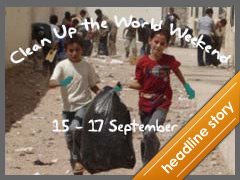What do the Nile River, Copacabana Beach and Sydney Harbor have in common? All three are targeted for clean up this weekend, along with hundreds of other sites worldwide, when 35 million volunteers from 122 countries will take part in this year’s Clean Up the World Weekend—celebrated globally September 15-17—which is part of the ongoing Clean Up the World campaign.

The campaign, held in conjunction with the United Nations Environment Programme (UNEP), has grown steadily since it first began in 1993. Activities range from cleaning up small villages to overhauling entire countries. Many communities also implement recycling and educational programs, or initiate water and energy conservation projects.
Since the start of the campaign, Clean Up the World members worldwide have collected an estimated 3,574,991 tons of trash—enough to fill 5,710 Olympic-size swimming pools. Plastic, glass, metal and cigarette butts are among the most commonly found items every year.
“From the world’s iconic sites to the sites of significance to remote local communities, Clean Up the World campaign brings people together in a meaningful activity that changes their lives and environment for the better,” said campaign Chairman and Founder Ian Kiernan, Recipient of the Order of Australia, in a press release.
How It All Began
The Clean Up the World campaign started in 1989 when Kiernan, an Australian solo-yachtsman and builder was appalled by the amount of garbage he came across while sailing. He organized a clean up of the Sydney Harbor, during which some 40,000 volunteers removed rusted car bodies, plastic, glass bottles and cigarette butts from the water.
The campaign went global in 1993, with Sydney becoming the headquarters for the Clean Up the World campaign. Today, the organization brings together hundreds of members from around the world, ranging from local community groups to national campaigns, that carry out environmental projects throughout the year. The Clean Up the World Weekend, held in September each year, has the highest participation of all of the organization’s activities.
“Clean Up the World mobilizes people around a powerful idea—taking the challenge of environment and sustainable development to our front doors, our backyards, and everywhere else around the globe,” said UNEP Executive Director Achim Steiner in a press release. “It comes with another idea that UNEP strongly believes in: that what we consider waste and rubbish today could become a resource for tomorrow.”
A Global Effort
Clean Up the World is truly a global campaign. Of 624 Clean Up the World members in 2006, 207 come from Africa; 171 from Asia-Pacific; 82 from Europe; 138 from Latin America and the Caribbean; 11 from North America; and 16 from West Asia.
The countries with the highest participation in the Clean Up the World campaign this year are India, Nigeria, Argentina and Kenya. The countries participating in the Clean Up the World campaign for the first time in 2006 are Afghanistan, Albania, Guyana and Latvia.
The following are just a sample of Clean Up the World activities that are taking place this weekend:
· Volunteers from fourteen countries across the Mediterranean Sea will engage in a wide range of activities, from underwater clean ups to environmental parades, in a joint effort to promote greener living in the region.
· In Egypt, the Arab Office for Youth and the Environment is focusing on the Clean Up the Nile initiative with 17 cities participating. The campaign seeks to highlight the importance of the Nile River for agriculture and development in a region prone to desertification.
· School children, divers, snorkellers and community volunteers will be cleaning up the world-famous Copacabana beach in Rio de Janeiro, Brazil. This clean up event is coordinated by Brazil’s popular TV show “Programa Na Praia” (“On the Beach”), which raises environmental awareness across the country.
· On the island of Newfoundland, off Canada’s Atlantic coast, Ocean Net volunteers will celebrate the 1000th marine clean up conducted since the group’s establishment in 1997 with underwater and beach clean ups at Topsail Beach.
· In the Chinese City of Shaoxing, situated in the Yangtze River delta, about 100 cycling enthusiasts will collect roadside rubbish during a bike ride on Clean Up the World weekend, targeting plastic bags and drink containers in particular.
· In Australia, where the Clean Up the World campaign started, volunteers will remove rubbish from the Sydney Harbor and Lane Cove National Park. Dozens more Australian volunteers will work with overseas communities as far as Ghana, the Philippines and the Kingdom of Tonga to help improve local environment and livelihoods, promoting this Australia-based campaign across the world.
“Many communities across the globe have faced uncertainty over the past year,” Kiernan said. “Clean Up the World is an opportunity to break down geographical and political barriers by working together to look after our shared environment. I encourage more groups to join us in creating greener cities and communities across the world.”





